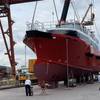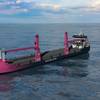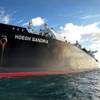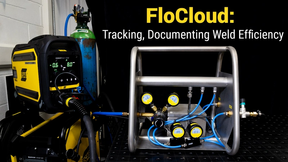IMO to Resolve Crucial Issues this Week
Ballast Water Treatment Guidelines
Guidelines for the Approval of Ballast Water Management Systems were finalised and approved by the IMO with shipboard and laboratory trials now required as part of the approval process. This is contrary to previous approval procedures which traditionally relied on laboratory tests only. Before these Guidelines can be officially adopted, however, the IMO’s sub-Committee on Design and Equipment will review the document.
The other Guidelines approved in principle were those for the Procedure for Approval of Ballast Water Management Systems that make use of ‘Active Substances’. It was agreed that Port State Control Guidelines will have to be amended to take into account the procedures for sampling ballast water management systems.
A key decision on the future of the Ballast Water Convention will be made at the MEPC meeting due to be held in July 2005. Having adopted at last week’s meeting the procedures to assess whether ballast water technology exists to meet the treatment standard in the Convention, these procedures will be put into action in July 2005, when a full assessment of current technology will be made. This will dictate whether or not the deadlines specified in the Convention will be met by the industry.
Air Emissions
Avoiding any political discussions on green house gas emissions (GHGs) due to perceived contradictions in connection with the Kyoto Protocol, the Committee continued progress on the technical matters associated with air emissions, including both amendments to Annex VI of MARPOL and GHGs. On the latter issue, a working group continued to develop Guidelines on a CO2 Indexing Scheme. This has been established on a trial basis, running voluntarily from 2005 to 2010. After 2010 a review will be undertaken to establish whether this indexing needs to be made mandatory. The trials will aim to describe the green house gas efficiency of an individual ship.
Some minor drafting amendments were made to MARPOL Annex VI although it is expected that at the next MEPC meeting in July 2005, and following entry into force of the Annex, a host of changes will be tabled.
Reception Facilities
Reacting to an industry paper submitted to the Committee about the continuing problems with inadequate port reception facilities, the Committee recommended that states and NGOs should pass on comments about problems and solutions regarding reception facilities. This falls within the remit of the industry’s Port Reception Facilities Forum, which will respond to this request.
PSSAs
In line with previous discussions on this issue, the possibility of reviewing the Guidelines for Designating PSSAs was subjected to lengthy debate by the Committee. Many states believe these Guidelines need updating in order to avoid possible abuse of this unique scheme in the future, while other states feel that the system is adequate. INTERTANKO and ICS submitted two joint papers suggesting amendments to certain elements of the Guidelines and the review form which accompanies the Guidelines, aimed at ensuring a more focused method of reviewing a PSSA proposal in the future.
Ironically, at the same session as this debate on the adequacy of the PSSA Guidelines in determining suitable proposals for a PSSA, the current proposal for the huge Western European sea area to become a PSSA was adopted as an MEPC Resolution.













